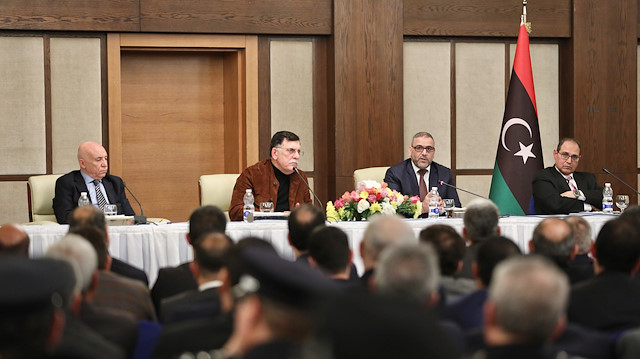
Germany seeks stronger commitment from regional actors for cease-fire, weapons embargo
Germany is set to host a major peace conference on Libya that will seek a stronger commitment from regional actors for a cease-fire in the war-torn country to pave the way for a political solution.
Chancellor Angela Merkel invited leaders from Turkey, Russia, the U.S., China, France, the U.K. and other regional actors to a single-day conference in Berlin on Sunday, amid a fragile cease-fire between Libya’s internationally recognized government and forces loyal to Libyan warlord Khalifa Haftar.
The German government cautioned against high expectations ahead of the conference and underlined that a single meeting could not end the conflict, but would be the beginning of a political process under the auspices of the United Nations.
Merkel’s spokesman Steffen Seibert confirmed on Friday that both Libya’s Prime Minister Fayez al-Sarraj and the eastern-based commander Khalifa Haftar accepted invitations for the conference.
- World leaders to attend
Turkish President Recep Tayyip Erdogan and Russian President Vladimir Putin, who brokered a cease-fire last weekend between the warring parties after months long clashes, already announced that they would attend the conference in Berlin.
French President Emmanuel Macron, British Prime Minister Boris Johnson and Italian Prime Minister Giuseppe Conte also confirmed their attendance.
The U.S. administration announced that Secretary of State Mike Pompeo would travel to Berlin for the conference and would push for a cease-fire and return to UN-facilitated talks for a political solution.
Top officials from Egypt and United Arab Emirates, main supporters of the Libya’s renegade commander Haftar, will also to take part in the conference.
Algeria’s President Abdelmadjid Tebboune, and Republic of Congo’s President Denis Sassou Nguesso, who chairs the African Union's High-Level Committee on Libya, were also invited.
- Germany’s priorities
Ahead of the conference, German Chancellor Merkel urged regional actors to support the cease-fire and respect the UN arms embargo on Libya.
“At the Libya conference, we must achieve above all that the weapons embargo will be implemented […] it was already agreed within the UN framework, but so far not adhered to,” she told a press conference on Thursday.
Haftar’s forces, which received backing from Egypt and the United Arab Emirates, began a major military offensive in April last year to capture Tripoli from the UN-recognized Government of National Accord (GNA), drawing international condemnation.
According to the UN, more than 1,000 people have been killed since the start of the offensive and over 5,000 others injured.
-Fragile cease-fire since Sunday
On Jan. 12, the warring sides of the Libyan conflict announced a cease-fire in response to a joint call by Turkish and Russian leaders.
But talks for a permanent cease-fire deal ended without an agreement on Monday after Libyan warlord Khalifa Haftar left Moscow without signing the deal.
Since the ouster of late ruler Muammar Gaddafi in 2011, two seats of power have emerged in Libya: one in eastern Libya supported mainly by Egypt and the UAE, and the other in Tripoli, which enjoys the UN and international recognition.
Hello, the comments you share on our site are a valuable resource for other users. Please respect other users and different opinions. Do not use rude, offensive, derogatory, or discriminatory language.
The floor is all yours.








